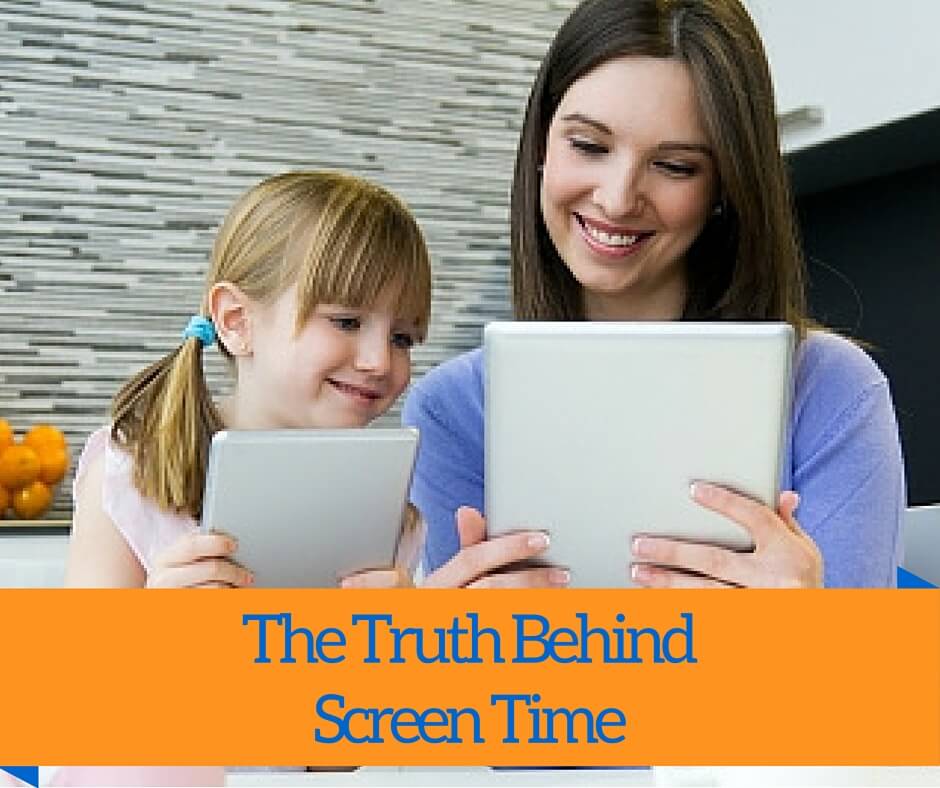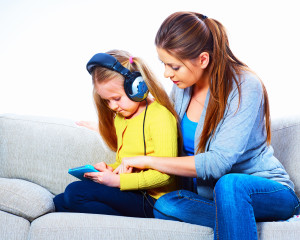The Truth Behind Screen Time
What are the screen time recommendations?
This past September,  the American Academy of Pediatrics updated its screen time recommendations to reflect the modern use and frequency of media. Parents are most familiar with the 1999 guidelines “discouraging ‘screen time’ for children under age 2 and limiting ‘screen time’ to two hours a day for children over age 2” (American Academy of Pediatrics, 2011). This recommendation isn’t practical in today’s environment where media has become integrated into our everyday lives, including parenting. To address this media shift the AAP hosted a “Media Research Symposium”, which exposed important information for parents struggling to navigate “screen time” in this media-rich age.
the American Academy of Pediatrics updated its screen time recommendations to reflect the modern use and frequency of media. Parents are most familiar with the 1999 guidelines “discouraging ‘screen time’ for children under age 2 and limiting ‘screen time’ to two hours a day for children over age 2” (American Academy of Pediatrics, 2011). This recommendation isn’t practical in today’s environment where media has become integrated into our everyday lives, including parenting. To address this media shift the AAP hosted a “Media Research Symposium”, which exposed important information for parents struggling to navigate “screen time” in this media-rich age.
These are some of our key takeaways:
- Screen media that mimics live interaction, like video-conferencing, promotes learning (Lexercise uses live, interactive video-conferencing.)
- “Co-viewing” and “co-participating” in your child’s media usage will increase the educational value by making them feel empowered and engaged (Lexercise daily practice guardian activities are designed for co-viewing and co-participating.)
- Digital media can improve behavior: executive function, self-control, problem-solving skills, and ability to follow directions (Lexercise’s interactive methods are designed to improve attention and self-regulation.)
- Media content matters more than the platform or time (Lexercise’s content is the research-backed structured literacy methodology.)
- Well-designed, educational games can promote experimentation, interactive learning, self-efficacy, and inquiry (Lexercise’s interactive games are designed to reinforce word structure concepts and reward daily practice.)
- “Digital media that distracts from social interactions (e.g., background TV, parents’ media over-use) clearly impairs learning, while other media (e.g., Skype, Facetime) can promote social interactions and learning” (Lexercise is built on a foundation of social interaction, both for direct instruction and for daily practice.)
3 C’s of a Balanced Media Diet
Parenting is without a doubt changing in today’s technological era in which, “[m]ost children under the age of 8 now have access to mobile devices in their homes” (Farmer Kris, 2015). So how can you embrace this technology and make it a benefit of your child’s life? Michael Levine and Lisa Guernsey writers of “Tap, Click, Read: Growing Readers in a World of Screens” recommend following the 3 C’s of a balanced media diet: content, context, child.
1. Content
Does this content support my child’s learning?
Is it well designed for learning specifically?
Does it make sense for my child’s age and developmental stage?
Lexercise is specifically designed using research-backed methods to educate and enhance literacy skills through technology.
2. Context
Is this a good balance in my child’s schedule?
Are they still getting other necessities in their life like social interaction, exercise, and sleep?
We customize everything for you and your child to accommodate your schedules and focus on distributing practice to prevent learning overload and frustration.
3. Child
How does my child respond to this media? Does it evoke positive or negative reactions?
Make sure to engage with your child’s media consumption. “Research indicates that ‘joint media engagement’ — talking with children about what they are viewing, experiencing or creating — supports cognitive development and helps children learn more from media” (Farmer Kris).
The Lexercise guardian activities are specifically designed to support “joint media engagement”.
If your child is struggling with reading, writing, or spelling Lexercise can raise their literacy skills as well as incorporate beneficial technology into your child’s life.
Improve Your Child’s Reading
Learn more about Lexercise today.
15-minute consultation
Marie Lunney
Marie struggled with reading, writing and spelling as a child and knows the frustrations of finding and receiving language therapy. She has since overcome her childhood struggles and recently graduated Cum Laude from Elon University with a BS/BA in Marketing and Entrepreneurship. Marie is enthusiastic about helping families find convenient, personalized and effective language therapy.



Leave a comment